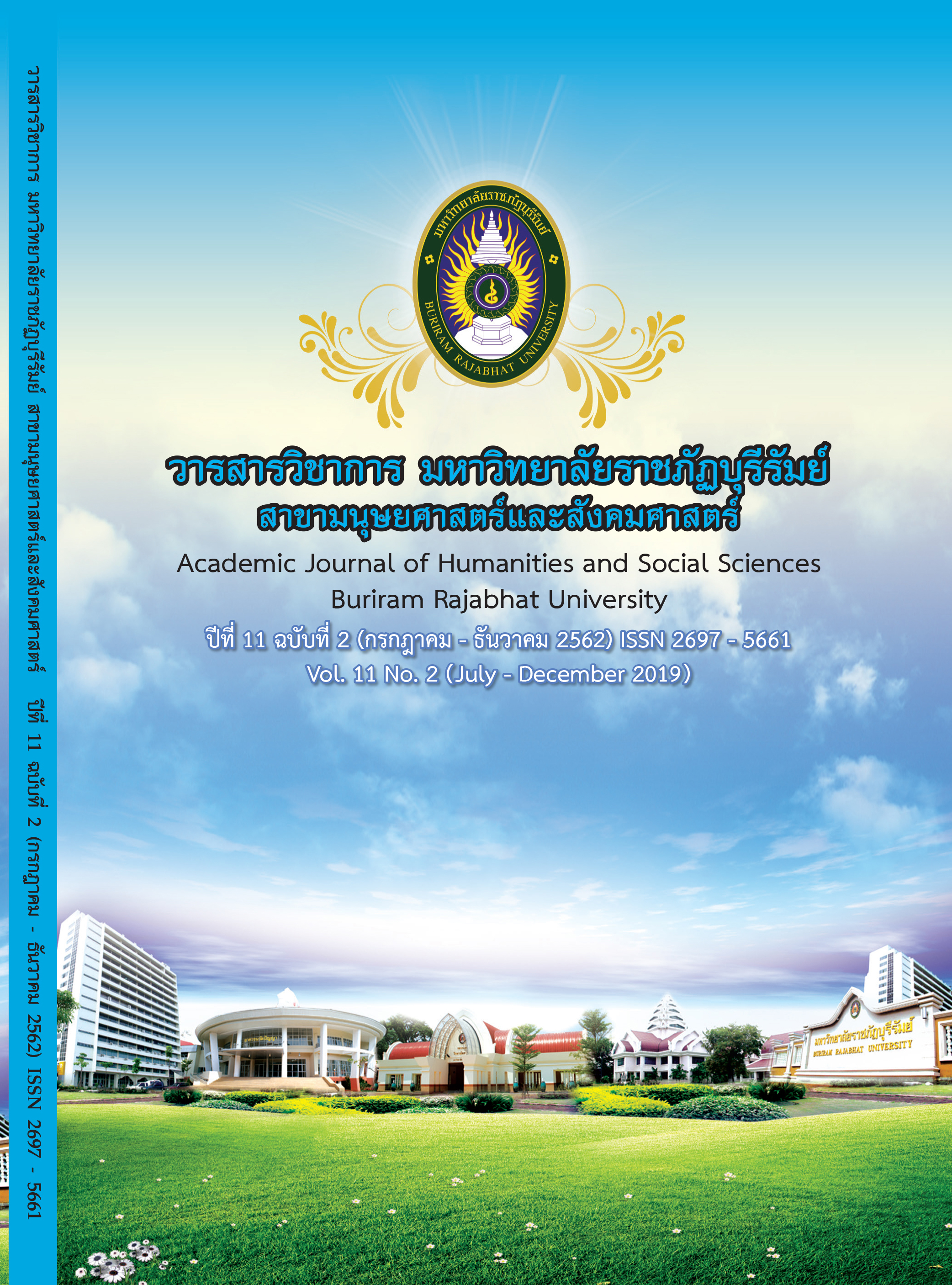การพัฒนาการฟังเพื่อความเข้าใจของนักศึกษาโดยใช้กระบวนการ Preparation – Familiarization – Assessment Process The Development of Undergraduate Students’ English Listening Comprehension Using the Preparation-Familiarization-Assessment Process
Main Article Content
บทคัดย่อ
การวิจัยครั้งนี้มีวัตถุประสงค์ เพื่อพัฒนาการฟังภาษาอังกฤษเพื่อความเข้าใจโดยใช้กระบวนการ Preparation-Familiarization-Assessment หรือเรียกย่อว่า PFA Process และเพื่อศึกษาปัจจัยที่ส่งผลต่อผลสัมฤทธิ์ทางการฟัง กลุ่มตัวอย่างเป็นนักศึกษาชั้นปีที่1 สาขาบริหารธุรกิจ มหาวิทยาลัยราชภัฏเทพสตรี จำนวน 34 คน การวิจัยนี้เป็นการศึกษากลุ่มทดลองเดี่ยวและดำเนินการวิจัยในภาคเรียนที่ 2 ปีการศึกษา 2561 เครื่องมือที่ใช้ในการวิจัยประกอบด้วย กระบวนการ PFA แบบทดสอบก่อนและหลังเรียน และการสัมภาษณ์แบบกึ่งโครงสร้าง สถิติที่ใช้การวิเคราะห์ข้อมูลได้แก่ ค่าเฉลี่ย ส่วนเบี่ยงเบนมาตรฐาน การทดสอบค่าที และการวิเคราะห์เอกสาร สำหรับปัจจัยที่ส่งผลต่อผลสัมฤทธิ์ทางการฟังใช้การสัมภาษณ์เก็บข้อมูลโดยการสัมภาษณ์แบบกึ่งโครงสร้าง ผลการวิจัยพบว่า การฟังภาษาอังกฤษเพื่อความเข้าใจของนักศึกษาพัฒนาขึ้นอย่างมีนัยสำคัญทางสถิติที่ระดับ .01 ส่วนปัจจัยที่ส่งผลต่อผลสัมฤทธิ์ทางการฟังคือ การฟังซ้ำ ความรู้เดิม และความรู้คำศัพท์
Article Details
- ต้นฉบับที่ได้รับการตีพิมพ์ในวารสารวิชาการ มหาวิทยาลัยราชภัฏบุรีรัมย์ สาขามนุษยศาสตร์และสังคมศาสตร์ ถือเป็นกรรมสิทธิ์ของมหาวิทยาลัยราชภัฏบุรีรัมย์ ห้ามนำข้อความทั้งหมดหรือบางส่วนไปพิมพ์ซ้ำเว้นเสียแต่ว่าจะได้รับอนุญาตจากมหาวิทยาลัยฯ เป็นลายลักษณ์อักษร
- เนื้อหาต้นฉบับที่ปรากฏในวารสารเป็นความรับผิดชอบของผู้เขียน ทั้งนี้ไม่รวมความผิดพลาด อันเกิดจากเทคนิคการพิมพ์
เอกสารอ้างอิง
Azizah, A. Authentic materials for developing listening comprehension. English Education Journal. 7 (3), 360-376.
Boonkit, K. (2010). Enhancing the development of speaking skills for non-native speakers of English. ScienceDirect Procedia-Social and Behavioral Sciences. 2, 1305 – 1309.
Bruner, R. F. (2000). Repetition is the first principle of all learning. Present Value: An Information column on teaching. Retrieved April28, 2000, from http://papers.ssrn.com/sol3/search.
Emerick, M. R. (2019). Explicit teaching and authenticity in L2 listening instruction: University language teachers’ beliefs, System. 18, 107-119.
Edrenius, R. (2018). Authentic Materials in Listening Lessons:A Study of Swedish Upper-Secondary English Teachers' Attitudes toward Authentic Materials in Listening Lessons. (Professional degree’s thesis) Faculty of Education and Social Sciences, Örebro University.
Gulec, S. & Durmus N. (2014). A study aiming to develop listening skills of elementary second grade students. ScienceDirect Procedia-Social and Behavioral Sciences. 191, 103-09.
Hayrapetyan, N. (2016) Teaching listening: Problems and Solutions. (Thesis) Faculty of European Languages and Communication, Yerevan State University. 1-2 (20), 204-214.
Jafari, K. & Hashim, F. (2012). The effect of using advance organizers on improving EFL learning comprehension: A mixed method study. ScienceDirect Procedia-Social and Behavioral Sciences. 40, 270-281.
Liubiniene, V. (2009). Developing listening skills in CLIL. Studies about Languages. 15, 89-93.
Matthews, J. (2018). Vocabulary for listening: Emerging evidence for high and mid –frequency vocabulary knowledge, System. 72, 23-36.
Ngo, N. (2019). Understanding the impact of listening strategy instruction on listening strategy use from a socio-cultural perspective, System. 81, 63-77.
Ni, D. (2017). Design and research on English listening teaching assisted by computer multimedia. International Journal of Emerging Technologies in Learning. 12(1), 32-43.
Perez, M. M. & Desmet, P. (2012). The effect input enhancement in L2 listening on incidental vocabulary learning: A review. ScienceDirect Procedia-Social and Behavioral Sciences 34, 153-157.
Rouhi, A., Nabavi S. M., & Mohebbi H. (2014). The effect of previewing questions, repetition of input, and topic preparation on listening comprehension of Iranian EFL learners. Iranian Journal of Language Teaching Research. 2(2), 73-85.
Safranj J. (2014). Advancing listening comprehension through movies. ScienceDirect Procedia-Social and Behavioral Sciences. 191, 169-173.
Tavil Z. M. (2010). Integrating listening and speaking skills to facilitate English language learners’ communicative competence. ScienceDirect Procedia-Social and Behavioral Sciences. 9, 765-770.
Selamat, S. & Sidhu, G. K. (2013). Enhancing listening comprehension: The role of Metacognitive Strategy Instruction (MetSI). ScienceDirect Procedia-Social and Behavioral Sciences. 90, 421-403.
Spigler, G. & Wilson, S. P. (2017). Familiarization: A theory of repetition suppression predicts interference between overlapping cortical representations. PLOS ONE journal. . Retrieved June 12, 2017, from http://dol.org/10.1371/journal.pone.0179306
Stæhr, L. S. (2009). Vocabulary knowledge and advanced listening comprehension in English as a foreign language. Studies in Second Language Acquisition. 31, 577-607.
Vandergrift, L. & Baker, S. (2015). Learner variables in second language listening comprehension: An exploratory path analysis. Language learning. 65, 390-416.
Wasuntarasobhit, S. & Chinkumtornwong, S. (1999). Improving listening comprehension through familiarization with features of spoken English. rEFLections. 1, 1-5.
Yavuz, F. et al., (2015). Problems and activities in listening skills in EFL Classrooms; from tradition to a more comprehensible input. ScienceDirect Procedia-Social and Behavioral Sciences. 197, 930 – 932.


